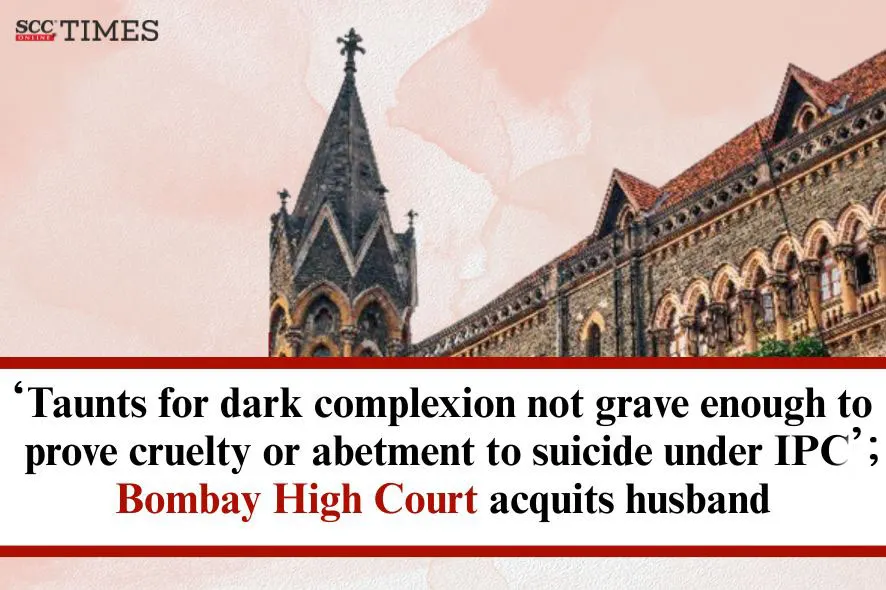Bombay High Court: The present criminal appeal was initiated by the appellant-husband, convicted by the Trial Court under Sections 498-A and 306 read with Section 34 of the Penal Code, 1860 (‘IPC’) for allegedly harassing his wife for dark complexion and abetting her suicide. A Single Judge Bench of S. M. Modak, J., allowed the appeal, holding that the prosecution could not prove the connection in between the harassment and the act of suicide. The Court observed that mere domestic quarrels, in absence of wilful conduct, could not be said to be of such a high degree so as to compel the wife to commit suicide.
Background:
The couple got married in 1993. They used to live together in a rural area where the husband worked as a shepherd. In January 1998, wife’s body was found in a well near village Degaon, Satara. Based on a complaint by deceased’s mother, an FIR was registered under Sections 498-A and 306 IPC, alleging that her daughter had been harassed and driven to commit suicide by the husband and father-in-law.
According to the prosecution, the deceased was subjected to persistent harassment. Witnesses (PW 2- mother of the deceased, PWs 3 and 4 — relatives of the deceased) testified that the deceased was taunted by her husband for dark complexion. The husband had also threatened to remarry. The father-in-law allegedly complained that the food was not prepared properly by her. These incidents were cited as the reasons for her decision to end her life.
The Trial Court accepted these statements and convicted the husband under both the sections, sentencing him to five years of rigorous imprisonment under Section 306 IPC and one year under Section 498-A IPC. The father-in-law was acquitted.
The husband denied the charges and claimed that the deceased’s death was accidental by falling into the well. He challenged the Trial Court’s findings, arguing that the prosecution failed to prove the connection in between the harassment due to dark complexion etc., and the act of suicide.
Analysis and Decision:
The Court while examining the evidence and findings of the Trial Court, acknowledged that indeed there was harassment, but it was not of that kind due to which criminal law could be set in motion. The Court observed that the quarrels arising out of matrimonial life were domestic quarrels, which could not be said to be of such a high degree so as to compel the wife to commit suicide, thereby making it an offence punishable under Sections 498-A and 306 IPC.
The Court referred to Section 498-A and noted that harassment must either be connected to a demand for dowry and the consequent harassment or involve wilful conduct of such a high degree that the wife was compelled to commit suicide. The Court observed that there was no finding indicating that the harassment was of such a high degree, nor was it established that the reason for the harassment was a demand for dowry.
The Court emphasised that every dispute, quarrel or altercation arising from the matrimonial life were not criminal offence and that it would only take colour of Criminal law when there were no alternatives for the wife but to put an end to her life, because of the harassment. The Court further highlighted that the presumption under Section 113-A of the Evidence Act, 1872, could not be invoked, since suicide itself was not an offence, and if someone abetted it, then only it became a punishable offence. The Court noted that, in the present case, the prosecution could not prove the connection between the harassment of deceased due to dark complexion etc., and the act of suicide; therefore, the judgment of the Trial Court could not be sustained in the eyes of law.
The Court, while allowing the appeal, set aside the judgment passed by the Additional Sessions Judge, Satara, and consequently acquitted the husband of the offences punishable under Sections 498-A and 306 IPC.
[Sadashiv Parbati Rupnawar v. State of Maharashtra, 2025 SCC OnLine Bom 2756, 11-07-2025]
Advocates who appeared in this case:
For the Appellant:- Nasreen S. K. Ayubi
For the Respondent:- State: R. S. Tendulkar



